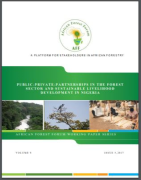Public private partnership as a concept has gained ground over the last few decades as a virile approach to delivering goods and services. It is a contractual agreement between a public agency and a private company or consortia of companies whereby the skills and assets of the public and private sectors are shared in delivering a service or facility. This concept has been successfully applied, particularly in infrastructure, as medium to long term arrangements between the public and private sectors in the provision of some service obligations of the public sector by the private sector, with clear agreement on shared objectives for delivery of public infrastructure and/ or public services, as well as benefit sharing. The forest sector had for a long time operated as a public sector concern, with sporadic private involvements. However, in recent years, public-private sector forestry development has emerged as a new world-wide practice for forestry development. The issuance of the World Bank Forest Sector Policy Paper in 1978 also propelled major changes in direction away from support for industrial forestry to forestry that meets local needs. This approach further opened the vistas for private participation in different parts of the world. However, in most cases, there have not been clear arrangements in terms of shared vision and objectives, co-delivery of goods and services as well as cost and benefit sharing. While some advances have been made in Europe, America and parts of Asia in this regard, same may not be said of most of Sub-Saharan Africa, and in particular, Nigeria. The study whose results are shared in this report examined the idea and concept of publicprivate sector partnerships in the forest sector by identifying promising PPP models/approaches for forest compatible sustainable livelihoods development that strengthens the capacity of the industry to address both social and environmental concerns, and therefore contributing to more sustainable, equitable and effective private sector development.This study was undertaken in the High/Moist Forest, Savanna and Sahel zones of Nigeria, and more specifically it was carried out in the selected states of Lagos, Ogun, Oyo, Osun, Edo, Abia, Rivers, Cross Rivers, Niger, Kaduna, Kano and Kwara. The states were further stratified by agro-ecological as well as geo-political settings. Within these settings, study localities were selected across primary forest production, secondary forest production, (wood processing, marketing and trade) including SMEs based on all forest types in the country.

